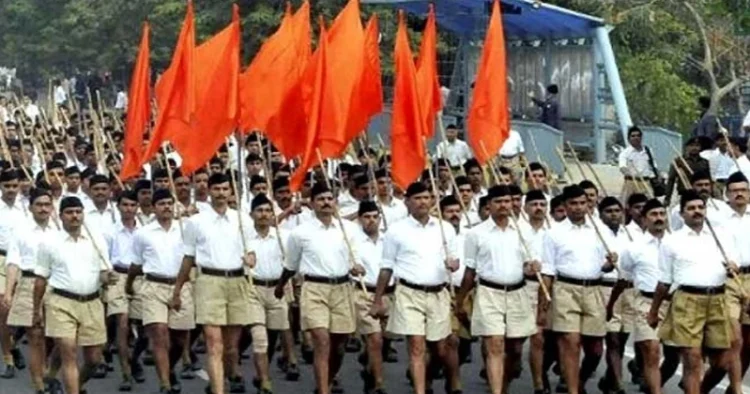Amidst the heart of Bharat, resonating with the echoes of history and the shadow of preconceived notions, a compelling transformation narrative unfolds. During my college days, like many others, I was exposed to a deluge of social media posts and articles that portrayed the Rashtriya Swayamsevak Sangh (RSS) in a negative light, often accentuating its Hindu aspects. It was easy to be influenced by these depictions without delving deeper into the core tenets and aspirations of the RSS.
However, engaging with some RSS leaders in Nagpur opened my eyes to an alternative perspective. My inquisitiveness led me to explore the annual speeches of RSS Sarsanghchalak Dr Mohan Bhagwat, particularly his Vijayadashami addresses. As the Vijayadashami is approaching, I realised it was an opportune moment to juxtapose the beliefs of the RSS with the vision for a modern Bharat.
One of the paramount themes in Dr Bhagwat’s speeches is self-reliance, encapsulated as “Atmanirbhar Bharat.” In a world where global dynamics continually shift, Dr Bhagwat underscores that self-reliance does not equate to India’s isolation from the global community. Instead, it entails strengthening the nation to meet the needs of its citizens first before engaging with the world. This vision transcends geopolitical borders and alliances, focusing on the sustenance of both Bharat and the wider world.
Yet, the question remains – how can Atmanirbhar Bharat be achieved? While it appears promising in theory, the core pillars of Atmanirbhar Bharat encompass the eradication of conservatism, women’s empowerment, nurturing future generations, and extending support to our farmers and Micro, Small and Medium Enterprises (MSME).
Previously, the literature I encountered in college led me to believe that the RSS was an organisation resistant to change. My exploration of Dr Bhagwat’s speeches revealed otherwise. He acknowledges the inevitability of change and advocates for replacing antiquated ideas with contemporary traditions that resonate with the present era. Importantly, he stresses preserving the nation’s social and historical fabric, anchoring change in our identity, thereby making it both progressive and sustainable.
Breaking away from stereotypical portrayals, Dr Bhagwat places significant emphasis on women’s empowerment. He envisions “Maatru Shakti” as a formidable force for national resurgence, underscoring the critical role of women’s empowerment in Atmanirbhar Bharat. The Government’s commitment to transitioning from women’s development to women-led development and introducing a 33 per cent reservation mark progressive strides toward a modern and inclusive nation.
Another dimension of Dr Bhagwat’s vision is rooted in the educational landscape. He champions the use of native languages for instruction, considering it the essence and identity of every student. In a world where English often dominates as a symbol of prestige, this emphasis on mother-tongue instruction aligns to nurture individualism rather than conformity. The relentless pursuit of success, like a race, has dominated for too long, and embracing the mother tongue allows children to express themselves and comprehend better.
Furthermore, RSS calls for an end to the stigmatisation of professions. He unequivocally asserts that no occupation is insignificant, whether it involves manual, financial, or intellectual labour. This perspective challenges societal norms that lead to professional stigmatisation, a factor contributing to the alarming rate of suicides in contemporary society. The message is clear: each vocation warrants respect, empowering younger generations to embrace their authentic selves.
Atmanirbhar Bharat‘s success is inextricably linked to the inclusivity of all segments of society. Dr Bhagwat and the RSS concentrate on enabling farmers to self-reliance and advocate for new policies supporting this objective. Additionally, they underscore the importance of bolstering MSMEs to compete on the global economic stage. The success of MSMEs is paramount, as they currently contribute nearly 30 per cent of Bharat’s GDP and 40 per cent of its exports. Agriculture, too, holds a pivotal position in the Indian economy, with over 70 per cent of rural households’ dependent on it for their livelihoods. This sector contributes approximately 17 per cent to the overall GDP and offers employment to around 58 per cent of the population.
Lastly, in a world grappling with China’s expansionist ambitions, RSS underscores the importance of international relations and neighbourhood-first policies. He advocates for cultivating strong ties with neighbouring countries such as Sri Lanka, Bangladesh, Nepal, and Myanmar, recognising their significance in global growth.
In essence, the RSS aspires to mould a modern, developed India that upholds equality in theory and practice. It envisions a nation where students can transcend the boundaries of their classrooms, where women receive equitable representation, where change is welcomed as a progressive force rather than a threat, and where every profession is respected. This vision defies the preconceptions I held in the past. It reveals an organisation dedicated to creating a Bharat rooted in its rich traditions, aspiring to be a developed nation. As I reflect on my journey from scepticism to inspiration, I acknowledge that this article merely scratches the surface of the profound and progressive vision of the RSS and Mohan Bhagwat . It envisions a modern Bharat, self-reliant and confident, where the nation’s spirit thrives in unity and diversity. It’s a vision that challenges preconceived notions and invites us to view the world through a different lens, one that is both engaging and inspiring.




















Comments